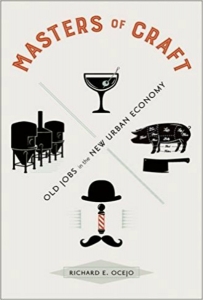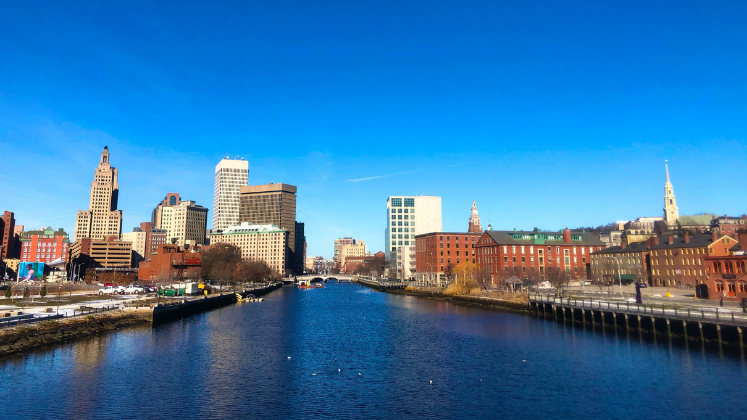In Masters of Craft: Old Jobs in the New Urban Economy, Richard E. Ocejo explores four traditionally working-class jobs – barbering, bartending, distilling and butchery – that have been increasingly redefined as hip, high-status and ‘middle-class’ for a number of urban workers today. Though the backdrop of gentrification, deindustrialisation and class hierarchy are not examined in depth, Padraic X. Scanlan finds this a careful, focused ethnographic study that succeeds in conveying the rituals and norms of these new-old workplaces and the transformation of contemporary urban labour.
Masters of Craft: Old Jobs in the New Urban Economy. Richard E. Ocejo. Princeton University Press. 2018.
 Find this book (affiliate link):
Find this book (affiliate link): ![]()
Sam Mature, a Chicago barber, was one of the dozens of Americans that Studs Terkel interviewed for Working, his collection of oral histories published in 1974. Working (subtitled ‘people talk about what they do all day and how they feel about what they do’) exalts everyday life. Every kind of work has something to teach us. Mature told Terkel about the craft of cutting hair and about the hierarchy of a barber shop, about the way junior barbers rented chairs and paid respects to the master barber. Barbers also needed to learn the art of talking to customers – how to be contrarian about sports and keep quiet about politics. Mature didn’t like to be tipped after he gave a haircut. ‘A doctor you don’t give him a tip. He’s a professional man,’ he explained. ‘Well, a barber is a professional man too. So I don’t think you should tip him.’
Cutting hair is skilled work, but it is a manual labour. Mature took pride in his work, but he knew that cutting hair wasn’t a high-class job. ‘If I had a son’, he said, ‘I’d want him to be more than just a barber’. But to survive in twenty-first century American cities, some barbers have gentrified. In Masters of Craft: Old Jobs in the New Urban Economy, Richard E. Ocejo, an urban sociologist at the John Jay College of Criminal Justice, explores four traditionally working-class jobs – barbering, bartending, distilling and butchery – that a small cohort of workers in New York have redefined as hip, high-status and ‘middle-class’. Ocejo embeds himself as an intern in a whole-animal butcher shop and in a small-batch distillery. He spends hours observing bartenders at a soigné cocktail bar and at an upscale men’s barbershop. Ocejo argues that in these workplaces, workers are able to transform their labour into a kind of ‘knowledge-work’, selling not only goods and services, but also cultural cachet and expertise to a wealthy urban clientele. Ocejo unpacks the rituals and norms of each workplace and examines the patterns of work common to all four jobs.
Masters of Craft is primarily about the dynamics of workplaces, and it is at its strongest when Ocejo is immersed in the specific rituals and exchanges of production and customer service. He anatomises how, for example, small-batch distillers try to shape the public’s taste for booze by reviving old styles of production, and how whole-animal butchers persuade customers to buy, cook and appreciate unconventional cuts of meat. At Death & Co., the Manhattan cocktail bar where many of the bartenders Ocejo observes and interviews worked, there is no written menu. Bartenders work to shape their customers’ tastes – if a customer wants a martini, it is an opportunity to demonstrate the wide range of variations of the basic gin-and-vermouth; if a customer doesn’t have a drink in mind, the bartender shapes their tastes.
 Image Credit: Crop of ‘Barber’ by Olatz eta Leire licensed under CC BY SA 2.0
Image Credit: Crop of ‘Barber’ by Olatz eta Leire licensed under CC BY SA 2.0
If the idea of a bar without menus or listed prices, where cocktails come with a chaser of tasting notes, provokes a spasm of inchoate but profound anxiety and despair, Masters of Craft might be difficult to swallow. Still, there is something satisfying, like a Robin Hood story, about manual workers celebrating and elevating their work, clawing back respect – and cash – from wealthy transplants, in defiance of the sky-high property values and crumbling rent controls that drive demand for the ‘authenticity’ that they erode. But most of the workers Ocejo profiles are educated and relatively well-to-do. They aren’t rising into the middle class by asserting the prestige of their work; they are moving laterally. ‘Pleasure in’, Ocejo writes, ‘and deriving meaning […] underlies work in the postindustrial era’. He identifies most of the workers he profiles as ‘drifters.’ By this he means that many did not pursue a particular career before moving into craft-work; they moved from office job to office job. ‘Drifters,’ Ocejo writes, ‘hold a unique position in the new economy’ and move into hip service jobs to find meaning in manual work that they couldn’t find in a cubicle. Ocejo’s drifters, mostly men, are also looking for a space in which to perform a very traditional masculinity: a hoary fantasy that ‘working with your hands’ might be a tonic against a putatively emasculating modernity. Work should be satisfying, but having the security to wager a livelihood on finding meaningful, rather than simply remunerative, work is the privilege of a minority. The implosion of industrial work has made plenty of people into drifters, but most of them aren’t mixing craft cocktails, finding pleasure in a world of thrumming insecurity.
As a work of careful, focused sociology, Masters of Craft succeeds in framing the ways workers in ‘old jobs in the new urban economy’ have redefined their labour. But Ocejo’s assertion that the jobs he studies are ‘middle-class’ invites a discussion of wider social forces that is mostly absent from the book. In the introduction, Ocejo skims through the history of American deindustrialisation and urban gentrification to set the scene. But these processes are dynamic and ongoing.
Masters of Craft also doesn’t have much to say about class, as such, or about the economic life and nickel-and-dime realities of new-old workplaces. How much do high-end barbers, butchers and bartenders make? Do they have families to support? Do they make their rent? Do they resent their managers or their subordinates? Ocejo remarks on the ‘masculine’ banter of the barbers he studies – who drives the biggest car, who is henpecked at home, who can demonstrate the most stoic good humour when the other barbers ‘talk shit’. These are straight and male spaces; how do they feel for everyone else? Ocejo, more interested in the minutiae of work, leaves a lot on the table. There is a moment, late in the book, where Ocejo narrates the firing and re-hiring of Aldo, one of the two Mexican-born master butchers at Dickson’s, the butcher shop where Ocejo worked as an intern and where most of the employees are white Americans. (As a side note, unpaid internships in manual labour are another marker of ‘old jobs in the new economy’ that Ocejo leaves unexamined.) The owner of the shop explains that Aldo was fired because he and two other butchers were ‘feeling like they were untouchable, too much horsing around’. Clearly, there are limits to the license that craft knowledge grants the people who possess it, but Ocejo does not show where they are or how they are policed.
The idea of uniqueness and ‘authenticity’ is something that these workplaces strive for, but also a product that they sell. The distillery Ocejo studies hand-numbers and hand-writes the labels for its spirits, and deliberately cultivates an aesthetic of rustic inconsistency in their products. And yet, the commercial success of ‘handmade’ and ‘artisanal’ products has birthed a snake that eats its own tail: the inconsistency of ‘artisan-made’ stuff is very easy to reproduce on an industrial scale. For example, Etsy, the crafting website and commercial platform, sells both hand-crafted goods and mass-produced just-in-time versions of bestselling items marketed as handmade.
In the men’s barbershop, Ocejo observes that ‘barbers talk, clients remain silent’. The barbers banter – like Mature did in the 1960s and 1970s – but not with their clients, who have paid a premium for the experience of being in a barbershop. Ocejo describes a rare African American client at the shop – another mostly unexamined glimmer of a wider social reality – who actually jokes around with the barbers, because he grew up going to black barbershops, where sociability remained part of the experience of getting a haircut. That he is the only client Ocejo observes who participates in the homosocial world of the shop strikes me as incredibly poignant. I’m glad that some people have been able to find satisfying work in a fracturing world. But there is a background hiss of joyless isolation and consumption audible in the silences of Masters of Craft. ‘Old jobs in the new economy’ sell relief from a profound and depressing alienation, as customers pay a premium to experience a community that they had a hand in destroying.
Note: This review gives the views of the author, and not the position of the LSE Review of Books blog, or of the London School of Economics. The LSE RB blog may receive a small commission if you choose to make a purchase through the above Amazon affiliate link. This is entirely independent of the coverage of the book on LSE Review of Books.








2 Comments